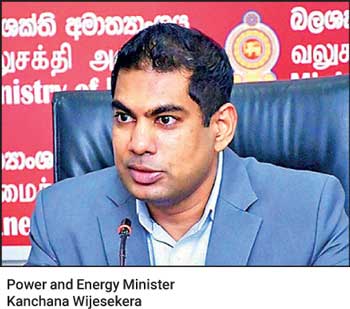Thursday Feb 19, 2026
Thursday Feb 19, 2026
Tuesday, 23 April 2024 01:19 - - {{hitsCtrl.values.hits}}
 Power and Energy Minister Kanchana Wijesekera has pointed fingers at the Janatha Vimukthi Peramuna (JVP) for obstructing the progress of the Ceylon Electricity Board (CEB) and impeding major power projects, resulting in significant economic losses for the country.
Power and Energy Minister Kanchana Wijesekera has pointed fingers at the Janatha Vimukthi Peramuna (JVP) for obstructing the progress of the Ceylon Electricity Board (CEB) and impeding major power projects, resulting in significant economic losses for the country.
Speaking to journalists, he accused the JVP of causing major losses to the CEB and the broader economy by halting crucial electricity projects.
“If there is a political party that has continuously caused losses to the power and energy generation, it is definitely the JVP. It adopts different names and symbols from time to time to conceal its actions. Once they contested in using the ‘tap’ symbol under the name Uma Oya Bahu Winashakari Viyapurthiyata Erehi Janatha Peramuna (People’s Front Against the Multi-Destructive Uma Oya Project) during a Municipal Council polls in Bandarawela and now use a ‘compass’ symbol under the name of National People’s Power (NPP).”
He claimed that the party, both internally through its trade unions and externally as a political entity, has hindered the development of the CEB and prevented the completion of vital power projects.
Highlighting the financial repercussions of these actions, Minister Wijesekera stated that the annual loss incurred due to the suspension of the Uma Oya Multi-Purpose Development Project amounts to Rs. 9 billion.
“This project could have been completed five years ago, had it not been for the interference,” he said.
Addressing the historical context of development projects, Minister Wijesekera stressed the need to account for major projects like Uma Oya when evaluating the country’s progress post-independence.
He also accused the JVP, now known as the NPP, of halting other significant power projects and causing damage to infrastructure.
Wijesekera cited the suspension of the Sampur power project, resulting in an annual loss of Rs. 32 billion. These financial burdens, he argued, are ultimately borne by the public through increased electricity bills.
He proposed that expanding power generation facilities at a lower cost, such as investing in renewable energy sources and reducing administrative expenses at the CEB are essential steps towards lowering electricity bills.
The Minister expressed optimism that these goals can be achieved through the implementation of the new Sri Lanka Electricity Bill.